“It (soul) is said to be buried and in a cave, but, when it turns to intelligence, to be freed from its fetters and to ascend, when it is started on the contemplation of reality by recollection… Souls then become, one might say, amphibious, compelled to live by turns the life There and the life here.” – Plotinus, Ennead (IV-8-4)
Why did we evolve with two eyes to see; what sort of duality exists inside of you and me; what came before the genesis of man; how long did it take for the sun to give birth to sand; what sort of supernova allowed for the Milky Way; will the galaxies ever collide or will the big bang reverse to bring us back into its vibe; does that mean our sun will draw us back into its fire; do humans also have a dormant desire—to return home to its celestial sire.
—
Such questions can lead us into metaphysical speculation of all kinds that eventually give way to what appears to be objective knowledge, only to be debunked in a matter of years, with cheers and tears, by the way. The mirrored reflection of the eye in the image above puts me in mind of Plotinus’ notion of our twofold existence on earth as flesh and blood creatures, opposed to what it was, is and will be when we are no longer with sentience.
—
“Whatever announcement it (matter) makes, therefore, is a lie, and if it appears great, it is small, if more, it is less; its apparent being is not real, but a sort of fleeting frivolity; hence, the things which seem to come to be in it are frivolities, nothing but phantoms in a phantom, like something in a mirror which really exists in one place but is reflected in another.” – Plotinus, Enneads (III-6-7)
—
Plotinus serves as a midway point for connecting modern philosophers with their formers. It allows for continuity and perspective of the wondrous dialectical dance that enfolds back into nothingness. In other words, once we peel back all the layers of an onion, we end up with… wait for it… Friedrich Nietzsche—before and after his break from so-called reality—where he initially develops the dialog rather vigorously in his happy go free science.
—
“Consciousness is the latest development of the organic, and hence also its most unfinished and unrobust feature. Consciousness gives rise to countless mistakes that lead an animal or human being to perish sooner than necessary.”
— Friedrich Nietzsche, The Gay Science 1.11
—
No need for me to explain at this particular time in history as to the ‘grave’ danger we as humans have placed ourselves in by focusing more on materialism—things that pertain to matter in the Plotinian sense—in turn muddying the clear water of awareness, and therefore bringing about a consciousness both myopic and egocentric in scope.
—
“One thinks consciousness constitutes the kernel of man, what is abiding, eternal, ultimate, most original in him! One takes consciousness to be a given determinate magnitude! One denies its growth and intermittences!” (ibid) So here we see the genesis of ancient man’s metaphysical formation of a soul, separate and distinct from man himself, a schism of sorts that we have yet to recover from as a collective.
—
“For the longest time, conscious thought was considered thought itself; only now does the truth dawn on us that by far the greatest part of our mind’s activity proceeds unconscious and unfelt.” (4.333) Finally, someone breaks through the ice and discovers the untapped wealth of depth psychology; however, let’s skip ahead to Nietzsche’s 5th section of his gay science to sample his maturity as a philosopher instead.
—
“This is what I consider to be true phenomenalism and perspectivism: that due to the nature of animal consciousness, the world of which we can become conscious is merely a surface — and sign-world, a world turned into generalities and thereby debased to its lowest common denominator, — that everything which enters consciousness thereby becomes shallow, thin, relatively stupid, general, a sign, a herd-mark; that all becoming conscious involves a vast and thorough corruption, falsification, superficialization, and generalization.” (5.354)
—
So we made a full circle and are back to Plotinus again. All that stuff out there, that so many of us are losing our heads over, is but a distortion that we share with human creatures, so if you want to observe things as they really are, then in the words of Morrison we have to break on through to the other side; that dark side of the moon to hear Mason saying, “I’ve always been mad, I know I’ve been mad, like the most of us…very hard to explain why you’re mad, even if you’re not mad…” Then, just maybe, we can pick up where Nietzsche left off. If not, then why not explain why you think you are sane?




